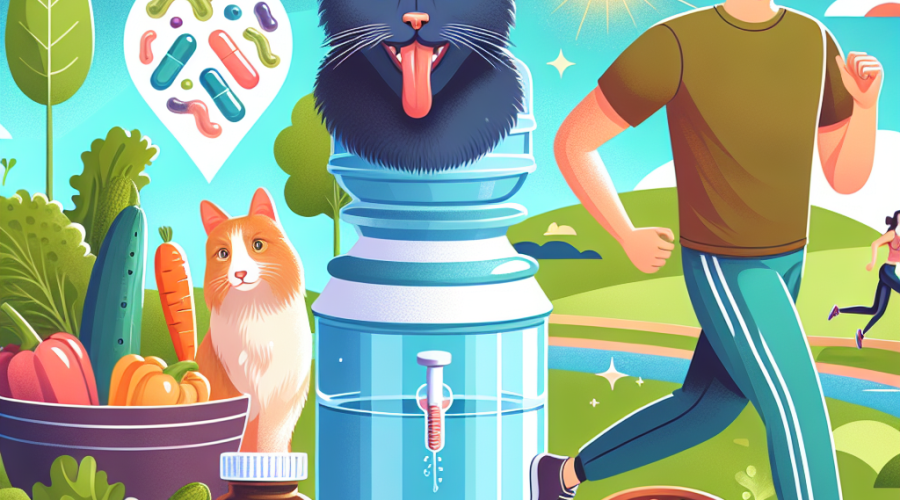Revitalise Your Pet’s Gut Health with Simple Shifts
Understanding the intricacies of your pet’s gut health is pivotal for their overall well-being. Just like humans, our furry friends have a complex ecosystem within their digestive tract. This ecosystem, teeming with billions of bacteria, plays a crucial role in digestion, immune function, and even mental health. If this delicate balance is thrown off-kilter, it can lead to a plethora of health issues. Fortunately, making a few simple shifts in your pet’s routine can have a profound impact on revitalizing their gut health.
One of the first steps in this gut health overhaul is examining the diet you’re providing for your pet. Is it rich in the nutrients necessary for a thriving gut microbiome? Many commercial pet foods, while convenient, may not always cater to the optimal nutritional needs of your pets. Consider incorporating more whole, fresh foods into their diet. A mix of lean proteins, fibrous vegetables, and probiotic-rich foods can contribute to a more diverse and robust gut flora. Remember, always consult with a vet before making significant changes to your pet’s diet.
Another factor to consider is the amount of exercise your pet gets. Physical activity isn’t just good for their muscles and weight management; it’s also beneficial for their digestive system. Regular exercise helps to stimulate the intestines and can aid in regular bowel movements, ensuring that waste and toxins are eliminated efficiently from the body. Whether it’s a daily walk or playtime in the backyard, encouraging your pet to stay active is a step in the right direction for their gut health.
Stress is a well-known enemy of gut health, and this holds true for pets as well. High levels of stress can disrupt the gastrointestinal system, leading to issues such as diarrhea or constipation. It’s important to create a calming environment for your pet. This can mean providing safe spaces in your home, using pheromone diffusers, or engaging in calming activities like gentle petting sessions or quiet time together. By reducing stress, you’re not only protecting their gut health but also enhancing their quality of life.
Probiotics have become a buzzword in human health, but did you know they’re just as beneficial for pets? These beneficial bacteria can be introduced into your pet’s diet through supplements or probiotic-rich foods like kefir or certain types of yogurt. Probiotics help to maintain the balance of good bacteria in the gut, which can be especially helpful after a course of antibiotics or during times of digestive upset. Always opt for pet-specific probiotic formulas, as these are tailored to the unique needs of your furry companion’s digestive system.
Hydration is another critical component of gut health. The digestive system requires a steady supply of water to function properly. Ensuring that your pet has constant access to clean, fresh water will aid in digestion and help to flush out toxins. For pets that are reluctant to drink enough water, consider incorporating wet foods or broths into their diet to increase fluid intake.
It’s important to pay attention to your pet’s dental health. Poor dental hygiene can lead to bacteria entering the digestive system, potentially causing upset and imbalance. Regular brushing, dental treats, and professional cleanings can help keep your pet’s mouth – and by extension, their gut – healthy.
By making these simple yet effective shifts, you can pave the way for a healthier and happier pet. Improved gut health can lead to better nutrient absorption, a stronger immune system, and a more balanced mood. It’s a fundamental aspect of pet care that, once addressed, can yield significant improvements in your pet’s day-to-day life.
Remember, gradual changes are key. Sudden dietary or lifestyle adjustments can cause more harm than good. Always introduce new foods or routines slowly and monitor your pet’s response. And of course, partnering with a veterinarian to guide you through any major health changes is always recommended. By taking these steps, you’re not just revitalizing your pet’s gut health; you’re enhancing their overall well-being and setting them up for a life full of vitality and joy.
FAQs
Q: What are the signs that my pet might need a gut health revitalisation?
A: If your pet is experiencing chronic digestive issues like diarrhoea, constipation, or flatulence, or if they seem lethargic and have a dull coat, it might indicate the need for gut health improvement.
Q: How can I naturally improve my pet’s gut health?
A: Incorporating probiotics through natural yoghurt or a high-quality supplement, and adding fibre-rich foods like pumpkin or beet pulp to your pet’s diet, can support a healthier digestive system.
Q: Can changing my pet’s diet have a positive impact on their gut health?
A: Absolutely, transitioning to a diet with easily digestible proteins, fewer fillers, and more natural ingredients can significantly benefit your pet’s gut health.
Q: What role does hydration play in maintaining my pet’s gut health?
A: Adequate hydration is crucial as it helps in the digestion of food and absorption of nutrients, while also keeping the intestinal lining well-lubricated for optimal function.
Q: Are there any specific exercises that can help my pet’s digestive health?
A: Regular exercise such as daily walks or play sessions can help maintain a healthy weight and stimulate proper digestion and bowel movements in your pet.

